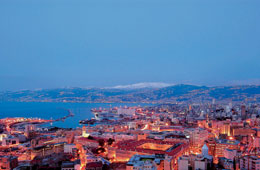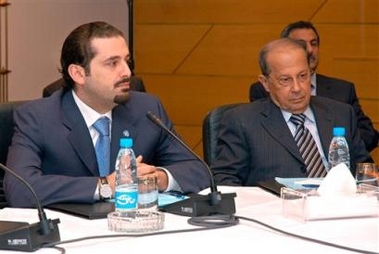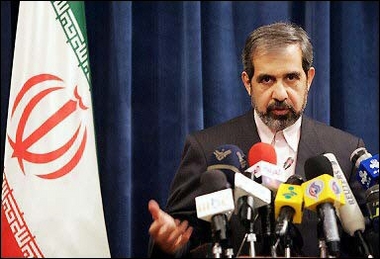 Financial times, By Roula Khalaf, The newly built stone mansions in the village of Kfar Jos symbolise the changing fortunes of Lebanon's Shia community, the country's largest minority sect. Nestling at the edge of the town of Nabatiye, known as the Shia capital of southern Lebanon, Kfar Jos's landscape has been transformed by a wave of immigrants who brought home part of the wealth earned in Africa and America.
Financial times, By Roula Khalaf, The newly built stone mansions in the village of Kfar Jos symbolise the changing fortunes of Lebanon's Shia community, the country's largest minority sect. Nestling at the edge of the town of Nabatiye, known as the Shia capital of southern Lebanon, Kfar Jos's landscape has been transformed by a wave of immigrants who brought home part of the wealth earned in Africa and America.
At Nabatiye town hall, officials say almost every family in this part of the Lebanon has a member working abroad, their remittances helping to lift the living standards of one of the country's most deprived regions. They proudly list the social and economic achievements, including the establishment of 16 bank branches, five hospitals and more than 15 schools.Signs of the Shia community's political empowerment are visible too, with posters of revered political chiefs plastered all over town and in surrounding villages.
Among them is the late Musa Sadr, the charismatic leader who was the first, in the 1970s, to assert the Shia's political rights and fight discrimination by the then dominant Sunni Muslims and Christian Maronites.
Pls Click View Video to view the video of Karen El Khazen, during a prime on LBC. The video is 20 MB …
 By Lin Noueihed , BEIRUT (Reuters) - Rival politicians resumed talks on Friday to end Lebanon's political crisis but were unlikely to decide to dismiss the president or agree on the fate of Hizbollah's weapons. The "national dialogue" conference, the first top-level political gathering since Lebanon's 1975-1990 civil war, was adjourned on April 3 with a promise to lay to rest a dispute over whether Emile Lahoud should stay or go.
By Lin Noueihed , BEIRUT (Reuters) - Rival politicians resumed talks on Friday to end Lebanon's political crisis but were unlikely to decide to dismiss the president or agree on the fate of Hizbollah's weapons. The "national dialogue" conference, the first top-level political gathering since Lebanon's 1975-1990 civil war, was adjourned on April 3 with a promise to lay to rest a dispute over whether Emile Lahoud should stay or go.
Lahoud has been under pressure to resign from politicians, who see him as the last vestige of Syrian tutelage that ended a year ago. The president, who has appeared relaxed and assertive on television in recent weeks, has so far refused to step down.
Parliament chooses the president in Lebanon, but political sources say that even the anti-Syrian bloc, which won a majority in the 128-seat house in May-June elections, has been unable to agree on its own preferred candidate let alone one that would be acceptable to other deputies. That being the case, the sources envision two scenarios.
 By Bill Samii, Iranian involvement in Lebanese affairs has been an issue since the early 1980s, and it came in for renewed attention last week. On April 18, a United Nations report urged Tehran to cooperate to resolve Lebanese issues. Washington's ambassador to the UN has welcomed the spotlight on Iran's involvement in Lebanon, while an outspoken Lebanese politician has been decrying this problem for some time.
By Bill Samii, Iranian involvement in Lebanese affairs has been an issue since the early 1980s, and it came in for renewed attention last week. On April 18, a United Nations report urged Tehran to cooperate to resolve Lebanese issues. Washington's ambassador to the UN has welcomed the spotlight on Iran's involvement in Lebanon, while an outspoken Lebanese politician has been decrying this problem for some time.WASHINGTON, April 24, 2006 (RFE/RL) -- UN Security Council Resolution 1559 made in 2004 calls for a withdrawal of foreign forces from Lebanon and the disarming of the country's militias. Syrian forces have pulled out, but UN special rapporteur Terje Roed-Larsen noted in his April 18 report that the provision calling for "the disbanding and disarmament of all Lebanese and non-Lebanese militias" has not been "fully implemented."
The report refers to Hizballah as "the most significant Lebanese militia," and it adds that "there has not yet been any noticeable change in the operational status and capabilities of Hizballah." Referring obliquely to the influence of Iran and Syria on Hizballah, the report adds, "a dialogue with parties other than the Lebanese authorities is indispensable" in the pursuit of disarming and disbanding the militias.
Khazen History


Historical Feature:
Churches and Monasteries of the Khazen family

St. Anthony of Padua Church in Ballouneh
Mar Abda Church in Bakaatit Kanaan
Saint Michael Church in Bkaatouta
Saint Therese Church in Qolayaat
Saint Simeon Stylites (مار سمعان العامودي) Church In Ajaltoun
Virgin Mary Church (سيدة المعونات) in Sheilé
Assumption of Mary Church in Ballouneh
1 - The sword of the Maronite Prince
2 - LES KHAZEN CONSULS DE FRANCE
3 - LES MARONITES & LES KHAZEN
4 - LES MAAN & LES KHAZEN
5 - ORIGINE DE LA FAMILLE
Population Movements to Keserwan - The Khazens and The Maans
ما جاء عن الثورة في المقاطعة الكسروانية
ثورة أهالي كسروان على المشايخ الخوازنة وأسبابها
Origins of the "Prince of Maronite" Title
Growing diversity: the Khazin sheiks and the clergy in the first decades of the 18th century
Historical Members:
Barbar Beik El Khazen [English]
Patriach Toubia Kaiss El Khazen(Biography & Life Part1 Part2) (Arabic)
Patriach Youssef Dargham El Khazen (Cont'd)
Cheikh Bishara Jafal El Khazen
Patriarch Youssef Raji El Khazen
The Martyrs Cheikh Philippe & Cheikh Farid El Khazen
Cheikh Nawfal El Khazen (Consul De France)
Cheikh Hossun El Khazen (Consul De France)
Cheikh Abou-Nawfal El Khazen (Consul De France)
Cheikh Francis Abee Nader & his son Yousef
Cheikh Abou-Kanso El Khazen (Consul De France)
Cheikh Abou Nader El Khazen
Cheikh Chafic El Khazen
Cheikh Keserwan El Khazen
Cheikh Serhal El Khazen [English]
Cheikh Rafiq El Khazen [English]
Cheikh Hanna El Khazen
Cheikha Arzi El Khazen
Marie El Khazen